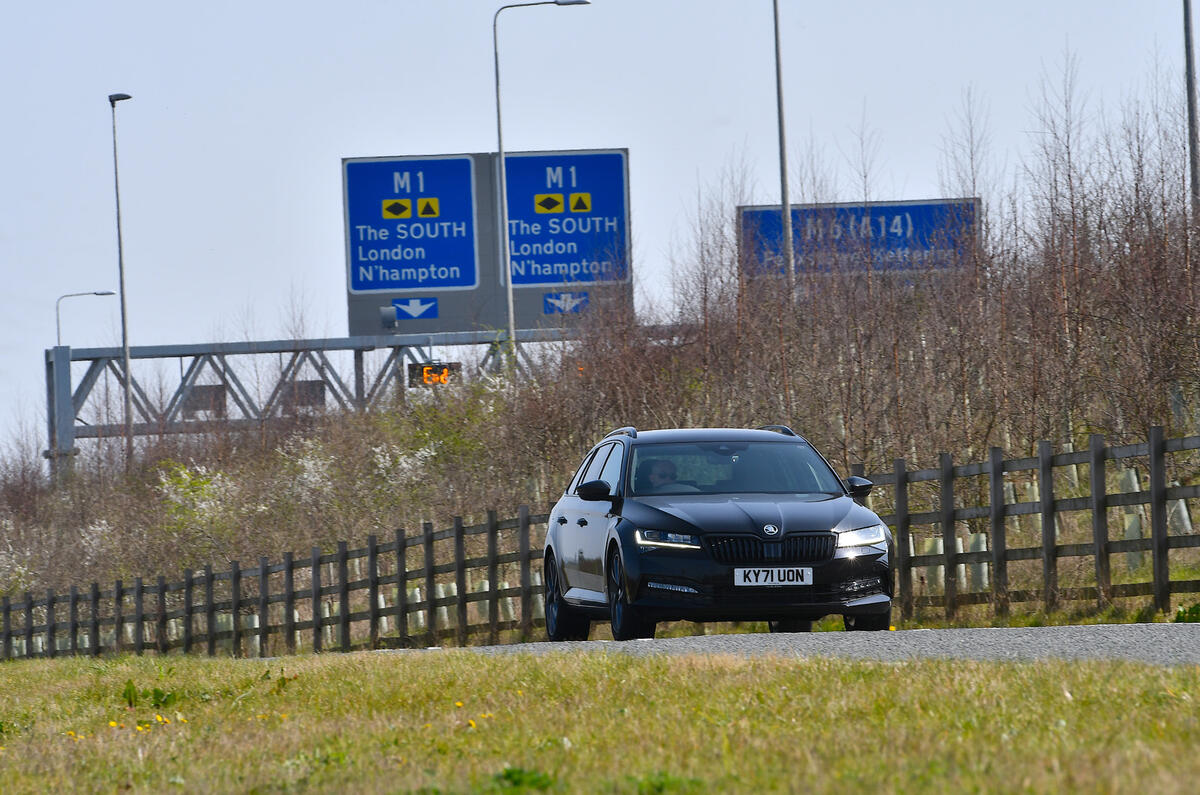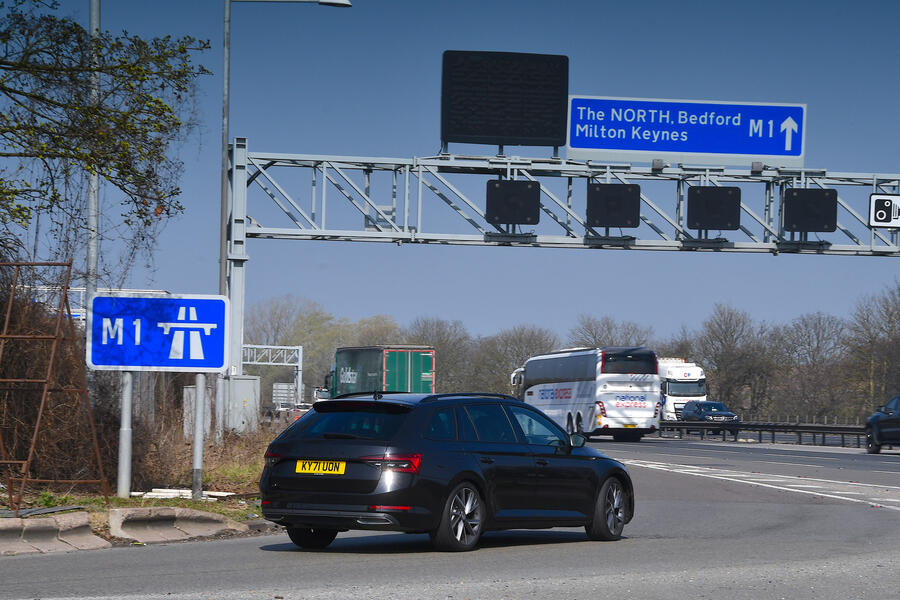Just as we turn off the M1 at junction 14, our car’s range indicator clicks around to 875 miles. That’s nearly 100 miles more than its WLTP figures predict and, in theory, means we could now schlep to Dundee and back without troubling a credit card.
You see, the Skoda Superb Estate we’re in is powered by an ultra-frugal diesel engine, aka the much-maligned, pilloried-by-the-tabloid-press, filthy, NOx-belching oil-burner that nearly brought this car’s parent company to its knees seven years ago as a result of the Dieselgate emissions scandal.
People have taken the bad press to heart, too. According to the Society of Manufacturers and Traders (SMMT), diesel engines powered 50.8% of all cars bought in the UK a decade ago, thanks in part to government incentives based on CO2 emissions, which tended to favour diesels.
Last year, that figure was just 14.3%, with the SMMT predicting that by the end of next year, diesel sales will make up a mere 7.9% of the car market. In other words, Rudolf Diesel’s 130-year-old technology is on the way to being consigned to the car history books.

But bad press or not, a diesel car’s range capability is still in demand by some drivers. Before the first lockdown, an independent survey commissioned by the RAC found that business car users were driving 24,000-25,000 miles a year, and even in a period that included lockdowns (May 2020-2021), it was still around 17,000 miles. So as life – and commerce – returns to normal, 500-mile-plus working weeks will be the norm again for such drivers.
Which is why we’re in the Superb today, using it just as a busy, long-haul business driver would, plying this nation’s main artery to find out if its fitness for purpose can yet be challenged. I feel quite at home, too. Pre-lockdown, I was among the extreme commuters, with an annual mileage of around 50,000.
Various media jobs over the years had landed me daily commutes of between 130 and 250 miles, which tended to be the bare minimum after I accounted for work appointments further afield. So the thought of using any car that didn’t require a trip to the black pump would have been anathema to me.
















































Join the debate
Add your comment
Fact checks instead of just random guff typed?
BEVs need more dealer vists to rectify faults. And where is that published? Mine has not been back for anything apart from a bumper paint in 2.5 years, 4 friends not back at all in lengthy periods. Needed 2 rear tyres in 28k miles, brakes hardly worn (look at electric car wheels, they don't have brake dust all over them). Might be worth a link to a non biased survey on reliability?
Batteries are getting cheaper, and they're getting more real range. Was pretty much only Tesla at 200+ miles 2 years ago, now a plethora of cars can do this. It either works for you or it doesn't, and Facts state that it'll do the vast majority.
Of course they'll get taxed at similar levels there's even something out for consultation if I remember correctly - road pricing, onto charging rates, etc You can't take away a major tax take and not replace it, living in Corbyn-land if you think that. Government spending with no tax income, how does that work?
Yep you just filled your A6, and it shows 1000 miles. If that's what you need then great a BEV is not for you yet. Utterly pointless comment. I was annoyed because I just went to plough a field with my car, and it didn't work - use the right vehicle for the right purpose.
Yes, charging from 80-100% is slower, and in most cars this is the last 40 miles of range. Since most don't need the 200 miles range this is largely determined by what you need it for. I'm lucky I also have a home charger and can leave it topped up overnight when I want to do 200 miles the next day.
Real issue is charging network- mainly reliability, but supply will become an issue at the rate BEVs are being sold at now. I ask if Tesla can do it why can the other manufacturers not do it? Tesla network is fit for purpose . Manufacturers doing it piecemeal and with very expensive fast charging. Tesla you just plug in and the software sorts payments direct from your linked account with no apps or card faff. I can drive for 200 miles, plug in for 40 mins while I have breakfast/lunch/dinner and carry on another 200 miles.
I'm concerned by the forthcoming charger availability, I'd likE to see the metal supply chain a bit more robust in terms of ethics (it's not all bad by the way). But will I go back to an ICE for my main car - not an earthy chance. Quiet, doesn't pump various things directly into where I live, will become cleaner as renewables ratio increases on powe production (and it has done consistently as some narrow minded people seem to ignore). It's faster than an equivalent ICE. There will be several solutions to transport in general, BEV is the best for cars at this point, may not be in the medium to long term, but that's the future. Reducing reliance on the Middle Wast and Russia also seems like a smart move with hindsight too doesn't it?
I agree with most of what you say. The reality is our politicians have decided BEV is the way forward. There are several big risks that are being glossed over: supply chain (China), market disruption reducing barriers to new entrants (China), power distribution, tax revenue to name a few.
A mid size BEV over 100k miles (battery life) will indirectly emit around 6.25 tons of CO2 based on UK grid. A 60kW battery manufacture will emit about 6 tons of CO2, for a total of just over 12 tons.
An A6 will use around 8000l of fuel at 55mpg ( I was doing around 70mpg when I got 1000 mi range) and emit about 20 tons of CO2. So a BEV wins and is a good solution in many applications. But if you want to pull a load, travel a long way without stopping to eat / drink / file reports etc. without any range anxiety, then a diesel works well and is far better for the environment than most PHEV's on a similar cycle.
Cost per mile for the diesel is cheaper if you use rapid chargers to charge your BEV, even though tax is 5% for electricity and over 50% for fossil fuels.
I'll keep mine till it falls to pieces, probably at around 200k miles.
So far as business sales are concerned, diesel sales are of course bombing because they are so penalised these days by BiK levels, whereas EV sales are booming because they are so subsidised. I wonder:
1. What their respective sales would be if taxation was equal?
2. By how much EV BiK will increase after 2030 when there will be no choice?